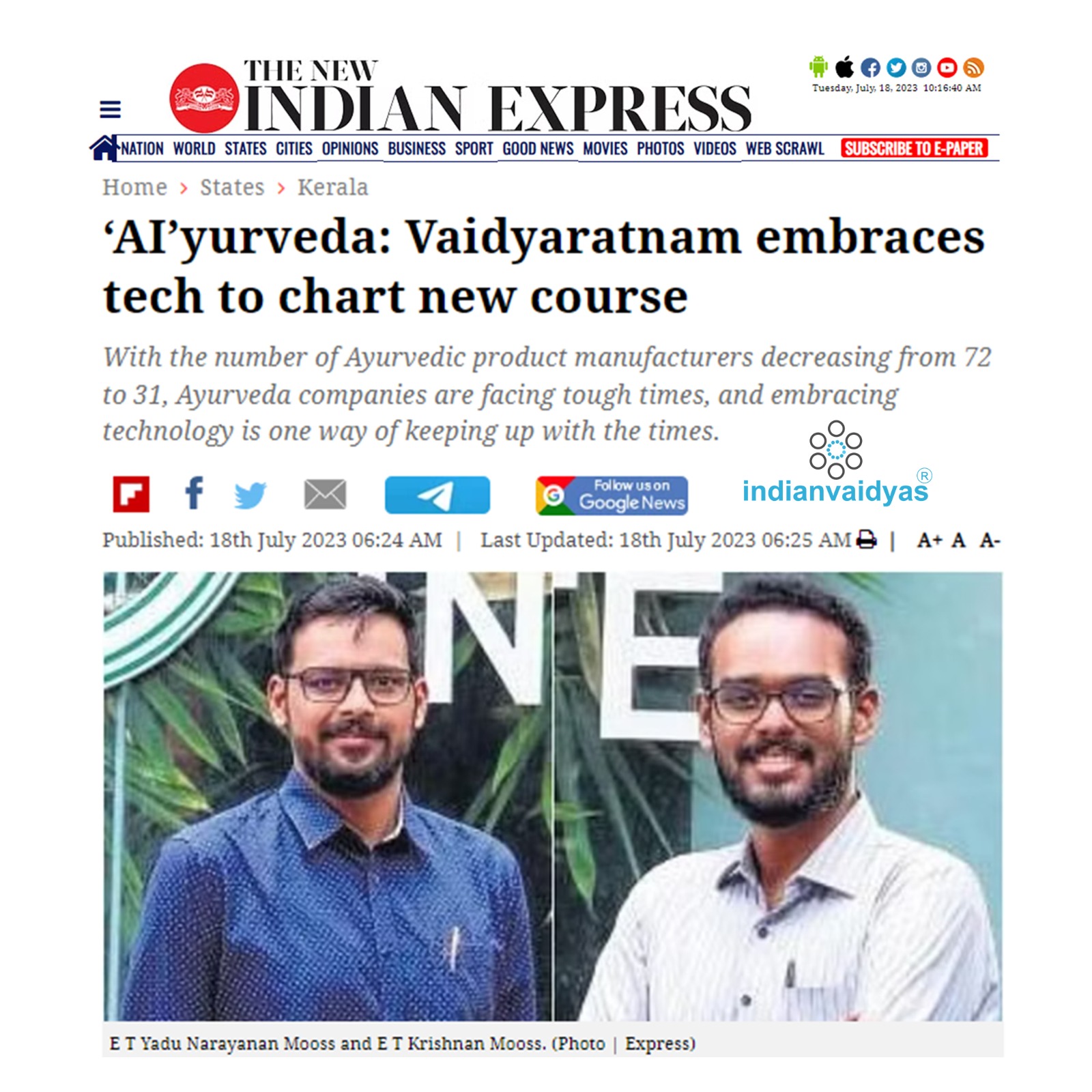ÔÇśAIÔÇÖyurveda: Vaidyaratnam embraces tech to chart new course
18-Jul-23 04:52:10

With the number of Ayurvedic product manufacturers decreasing from 72 to 31, Ayurveda companies are facing tough times, and embracing technology is one way of keeping up with the times.
KOCHI: In a remarkable transformation, a traditional Ayurvedic company is embarking on a journey to redefine itself. With the utilisation of artificial intelligence (AI) for authenticating herbs and raw materials, the implementation of a sensor to maintain consistent taste in medicines and kashayams, and the establishment of a buyback agreement with tribal communities for a reliable supply of herbs, shrubs, and plants, this company is charting a new course forward.
The Vaidyaratnam Group, an 82-year-old company based in Thrissur, is undergoing a redefinition under the leadership of fifth-generation founders E T Yadu Narayanan Mooss and E T Krishnan Mooss. In their early 30s, the cousin brothers are determined to propel the Rs 250 crore group to new heights by embracing the latest technological advancements.
“The people who can identify the herbs and plants correctly have declined considerably now. So, we are trying to use technology to fill the gap. Using AI, we are developing a tool that can identify whether the herb is authentic or not,” said Yadu Narayanan, executive director of the group, which is aiming to achieve a turnover of Rs 500 crore by 2030.
“By capturing and analyzing thousands of images of each herb, we plan to create a mathematical model of how the herb would look in reality. And based on this, we would develop a sensor that would identify the particular herb correctly,” explained Yadu Narayanan. The decision to use AI came after the group found variations in the raw materials it received from suppliers as they came from different species.
Additionally, the Vaidyaratnam Group is working on a sensor to ensure consistency in the taste of their medicines and kashayams (decoctions). Sourness levels can vary depending on factors such as when the herbs are harvested. “We are in discussions to develop a sensor that would identify the compounds. We would provide thousands of samples, and the tech partner would create a standard model of a particular medicine, and we would have to match that,” said Yadu Narayanan. This would help the Ayurvedic major ensure a consistent taste.
To ensure a steady supply of herbs, plants, and other raw materials, Krishnan Mooss, who is also executive director of Vaidyaratnam Group, has tied up with the tribal communities of Attappadi in Palakkad and the north Indian state of Uttarakhand. “This is a sort of backward integration,” he said. As per the Memorandum of Understanding (MoU), the tribal groups will cultivate the herbs, and we will buy them back. “This will be a source of income for them while we get genuine raw materials,”he explained.
The Vaidyaratnam Group has also held discussions with the Uttarakhand government for similar buyback agreements with tribal groups in the north Indian state. “The Uttarakhand government has shown a lot of interest in starting such ventures. We started buying 5–6 raw materials from them. They have started a lab there. They will do a basic analysis and send us the report. If we are satisfied with the quality, they will send the raw material. It’s a pre-purchase agreement, provided the quality is met,” said Krishnan Mooss.
Ayurveda companies are facing tough times, and embracing technology is one way of keeping up with the times. Over time, the number of Ayurvedic product manufacturers has decreased from 72 to 31. “Ayurveda is a 5,000-year-old science. The Pancha Bhoota, or the five great elements, is its core strength. As the fifth generation of the founders, our prime focus is to ensure that the company’s ethics, values, and tradition are kept alive even while contemporizing the concept,” said Yadu Narayanan.
The cousins said the group has as many as 520 products, though only 20–25 are widely used. “We don’t believe in the idea that only profitable products need to be sold. We are selling non-profit products too. By selling all the 520 products, we are ensuring that we have a solution to all the problems,” said Krishnan Mooss.
SOURCE & CREDIT: NEW INDIAN EXPRESS.COM